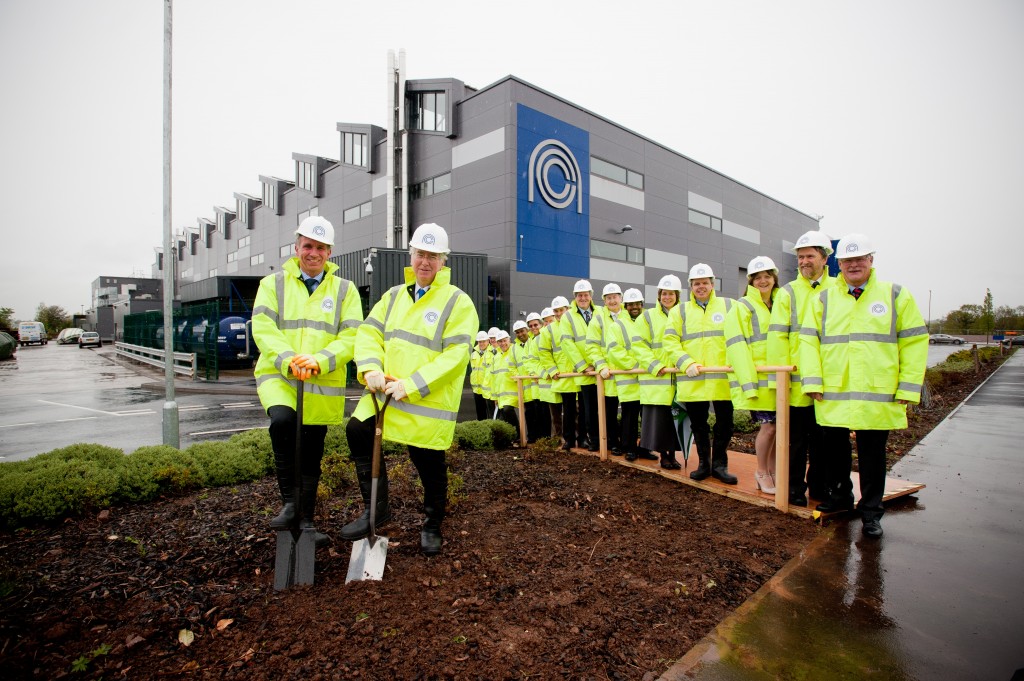Construction on the second phase of Bristol’s pioneering National Composite Centre (NCC) is underway following a turf cutting ceremony attended by business minister Michael Fallon. The work, supported by Government funding of £28m, will double the size of the NCC and allow it to extend its capabilities to develop composite technology for the aerospace, automotive, renewable energy and rail sectors.
This will bring an additional 50 NCC jobs, a further 30 to 50 jobs within the member organisations and 80 to 150 construction jobs during the build phase.
As well as providing increased capacity and a dedicated high-speed composite manufacturing technology facility, there will be a new world-class training centre for higher level and vocational skills development. This will help train the next generation of engineers in composites manufacturing and technologies and bring together leading businesses, colleges and universities.
Mr Fallon, who was joined by West business leaders at the ceremony, said: “This technology and innovation centre is an important asset for the south west and the UK. It is a real collaborative success story and helping to give us a competitive advantage in composites – a vital technology in high value manufacturing.
“Composites manufacturing is a real growth industry for the future. It’s very exciting to see that work on the extension is now underway thanks to government support and funding. These plans will make it one of the largest research and technology centres of its type in the world and help to maintain our global lead in this technology area. It will increase the centre's ability to get new products from the laboratory to the shop-floor and widen the scope of its activities.”
NCC chief executive Professor Peter Chivers added: “The minister’s support reflects the Government’s on-going commitment to High Value Manufacturing and its growth in the UK. The extended NCC will provide for further innovation in composites manufacturing and technology development, skills and education, and offers greater support for SMEs and the supply chain across all sectors. It will be fundamental in enabling the UK to remain competitive in this rapidly growing global market.
“As well as initiating the NCC, another key element of the UK Composite Strategy was to form the UK Composite Leadership Forum (CLF), which we have facilitated here at the NCC. The CLF brings together senior industrialists, academics, funders and policy makers to identify and articulate industry’s common needs and shared actions to enable future growth. With the industry backing, the expert academic research and the state-of-the-art NCC facilities, we now have a world-class platform for catalysing that growth.”
The Government’s Catapult programme is managed by the Technology Strategy Board (TSB), the UK’s innovation agency. The TSB announced today that it will invest a record £440 million this year to support innovative businesses and drive growth across the UK. The 2013-14 Delivery Plan sets out the board’s priorities for the coming year as part of their commitment to knowledge sharing and collaboration. It also explains how businesses will be able to access an even wider range of support across the entire innovation journey. Technology areas that will benefit from the investment include renewable energy, future cities, advanced materials, satellites, digital technologies and healthcare.
The NCC is owned by the University of Bristol and draws on established links to world class composites research at Bristol, the University of Bath and other UK Universities.
Professor Guy Orpen, Pro Vice-Chancellor Research at the University of Bristol, said: “The success of the NCC and the strong support of industry partners prompted the University to bid to the Government to expand its scale and range of activities. The successful bid will lead to the doubling of the physical size of the NCC to around 17,000 square metres.
“A substantial part of the expansion will be for academic and training use. As well as providing space for technician skills training, it will accommodate University staff, students, and in particular postgraduates in the field of materials science and engineering, alongside other academic and industrial researchers. This bringing together of leading academics from multiple universities, with HE and FE learners, alongside industrial technology and prototype product development activities, all under one roof, is a breakthrough model and will offer UK industry and academia a huge collaborative advantage.
“The second phase of the NCC marks the beginning of what is becoming a major engineering, science and innovation campus in the north of the city.”
The National Composites Centre is on Bristol & Bath Science Park, forming a key science and technology hub. The minister met several early-stage technology companies who are tenants of the Park.
Science Park chief executive Bonnie Dean said: “It is very encouraging to see the government putting additional investment into the NCC so soon after it opened.”
Pictured: NCC chief executive Peter Chivers, left, with business minister Michael Fallon, industry leaders and academics





























